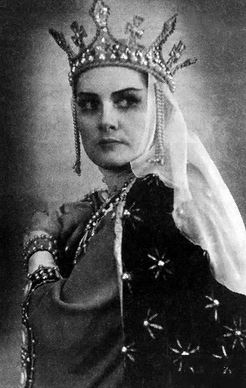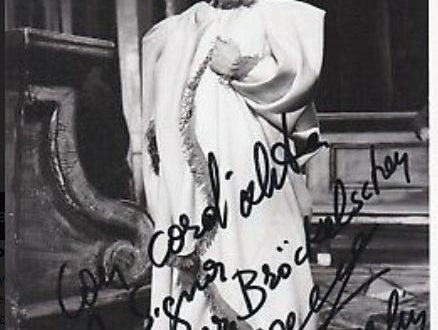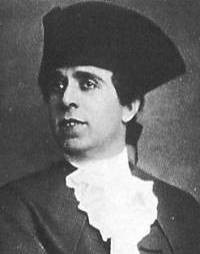
Larisa Ivanovna Avdeeva |
Larisa Avdeeva
Born in Moscow, in the family of an opera singer. Not yet thinking about an opera career, she was already brought up as a singer, listening to folk songs, romances, opera arias sounding in the house. At the age of 11, Larisa Ivanovna sings in a choir club at the House of Artistic Education of Children in the Rostokinsky District, and as part of this team she even performed at gala evenings at the Bolshoi Theater. However, at first, the future singer was far from thinking of becoming a professional singer. After graduating from school during the Great Patriotic War, Larisa Ivanovna enters the construction institute. But soon she realizes that her true vocation is still musical theater, and from the second year of the institute she goes to the Opera and Drama Studio. K. S. Stanislavsky. Here, under the guidance of a very experienced and sensitive teacher Shor-Plotnikova, she continued her musical education and received a professional education as a singer. At the end of the studio in 1947, Larisa Ivanovna was accepted into the theater of Stanislavsky and Nemirovich-Danchenko. Work in this theater was of great importance for the formation of the creative image of the young singer. The thoughtful attitude towards creative work inherent in the then collective of the theater, the struggle against opera clichés and routine – all this taught Larisa Ivanovna to work independently on a musical image. Olga in “Eugene Onegin”, the Mistress of the Copper Mountain in “The Stone Flower” by K. Molchanova and other parts sung in this theater testified to the gradually increasing skill of the young singer.
In 1952, Larisa Ivanovna was given a debut at the Bolshoi Theater in the role of Olga, after which she became a soloist of the Bolshoi, where she performed continuously for 30 years. A beautiful and big voice, a good vocal school, excellent stage preparation allowed Larisa Ivanovna to enter the main mezzo-soprano repertoire of the theater in a short time.
Critics of those years noted: “Avdeeva is charming in the role of the coquettish and playful Olga, truly poetic in the lyrical part of Spring (“The Snow Maiden”) and in the tragic role of the mournful schismatic Marfa (“Khovanshchina”) dooming herself to death … “.
But still, the best parts of the artist’s repertoire in those years were Lyubasha in The Tsar’s Bride, Lel in The Snow Maiden and Carmen.
The predominant feature of the talent of the young Avdeeva was the lyrical beginning. This was due to the very nature of her voice – light, bright and warm in timbre. This lyricism also determined the originality of the stage interpretation of a particular part, which Larisa Ivanovna sang. Tragic is the fate of Lyubasha, who became a victim of her love for Gryaznoy and vengeful feelings for Martha. N. A. Rimsky-Korsakov endowed Lyubasha with a strong and strong-willed character. But in the stage behavior of Avdeeva, criticism of those years noted: “First of all, one feels the selflessness of Lyubasha’s love, for the sake of Gryazny, who forgot everything -“ father and mother … her tribe and family ”, and a purely Russian, charming femininity inherent in this infinitely deeply loving and suffering girl … Avdeeva’s voice sounds natural and expressive, following the subtle melodic curves of the widely sung melodies that prevail in this part.
Another interesting role that the artist succeeded at the beginning of her career was Lel. In the role of a shepherd – a singer and a favorite of the sun – Larisa Ivanovna Avdeeva attracted the listener with the enthusiasm of youth, the artlessness of the song element that fills this fabulous part. The image of Lelya was so successful for the singer that during the second recording of “The Snow Maiden” it was she who was invited to record in 1957.
In 1953, Larisa Ivanovna took part in a new production of G. Bizet’s opera Carmen, and here she was expected to succeed. As the music critics of those years noted, “Carmen” by Avdeeva is, first of all, a woman for whom the feeling that fills her life is free from any conventions and fetters. That is why it is so natural that Carmen soon got tired of Jose’s selfish love, in which she finds neither joy nor happiness. Therefore, in the manifestations of Carmen’s love for Escamillo, the actress feels not only the sincerity of feelings, but also the joy of liberation. Completely transformed, Karmen-Avdeeva appears at a festival in Seville, happy, even a little solemn. And in the very death of Karmen-Avdeeva there is neither resignation to fate, nor fatal doom. she dies, filled with a selfless feeling of love for Escamillo.
Disco and videography by L. I. Avdeeva:
- Film-opera “Boris Godunov”, filming in 1954, L. Avdeeva – Marina Mnishek (other roles – A. Pirogov, M. Mikhailov, N. Khanaev, G. Nelepp, I. Kozlovsky, etc.)
- Recording of “Eugene Onegin” in 1955, conducted by B. Khaikin, L. Avdeev – Olga (partners – E. Belov, S. Lemeshev, G. Vishnevskaya, I. Petrov and others). Currently, a CD has been released by a number of domestic and foreign firms..
- Recording of “The Snow Maiden” in 1957, conducted by E. Svetlanov, L. Avdeev
- Lel (partners – V. Firsova, V. Borisenko, A. Krivchenya, G. Vishnevskaya, Yu. Galkin, I. Kozlovsky and others).
- CD of the American company “Allegro” – recording (live) of 1966 of the opera “Sadko” conducted by E. Svetlanov, L. Avdeev – Lyubava (partners – V. Petrov, V. Firsova and others).
- Recording of “Eugene Onegin” in 1978, conducted by M. Ermler, L. Avdeev – Nanny (partners – T. Milashkina, T. Sinyavskaya, Y. Mazurok, V. Atlantov, E. Nesterenko, etc.).





